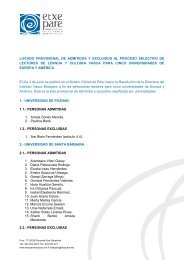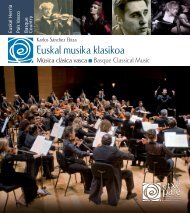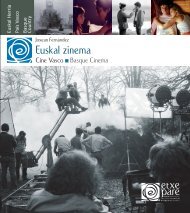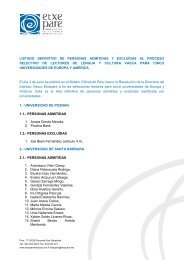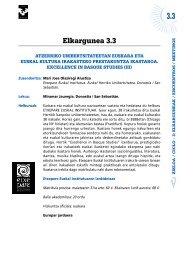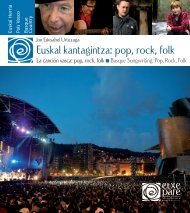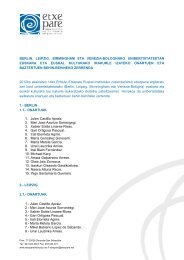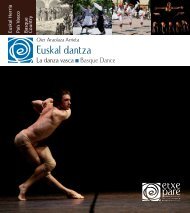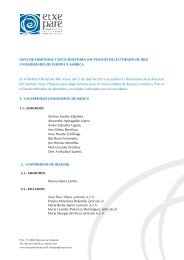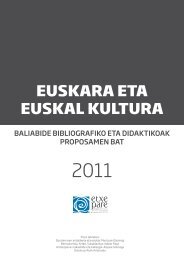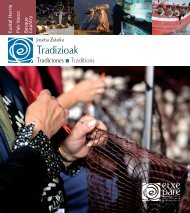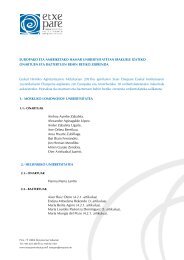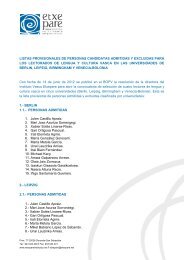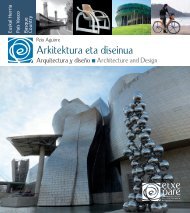XX. mendeko euskal literatura - Etxepare, Euskal Institutua
XX. mendeko euskal literatura - Etxepare, Euskal Institutua
XX. mendeko euskal literatura - Etxepare, Euskal Institutua
You also want an ePaper? Increase the reach of your titles
YUMPU automatically turns print PDFs into web optimized ePapers that Google loves.
(1953), Belleza cruel (1958) y Toco la tierra (1962).<br />
Estos dos últimos muestran un mayor interés por las<br />
cuestiones sociales y un posicionamiento radical en<br />
favor del ser humano que sufre.<br />
Gabriel Celaya fue uno de los poetas destacados<br />
dentro de la denominada “poesía comprometida”.<br />
Su primera etapa poética es de carácter existencialista.<br />
En los años 1950 se integra en la estética del<br />
compromiso, fruto de lo cual son los poemarios Lo<br />
demás es silencio (1952) y Cantos Íberos (1955). También<br />
ensayó el experimentalismo y la poesía concreta<br />
en Campos semánticos (1971). Recibió el Premio Nacional<br />
de las Letras Españolas en 1986.<br />
La trayectoria de Blas de Otero puede clasificarse<br />
en tres etapas, que responden a los tres momentos<br />
de crisis que experimentó el propio poeta: la etapa<br />
espiritual (Baladitas humildes), la etapa existencial<br />
(Ángel fieramente humano y Redoble de conciencia)<br />
y la etapa social (Pido la paz y la palabra).<br />
Entre los autores nacidos tras la guerra se encuentran<br />
Juan Ramón Corpas (Estella, 1952), Eduardo Apodaca<br />
(Bilbao, 1952), Julia Otxoa (San Sebastián, 1953),<br />
Francisco Javier Irazoki (Lesaka, 1954), Iñaki Ezkerra<br />
por el ángel (1950), Víspera de la vida (1953), Los días<br />
duros (1953), Belleza cruel (1958) and Toco la tierra<br />
(1962). These last two works demonstrate a growing<br />
interest in social questions and a radical position in favour<br />
of those humans who experience suffering.<br />
Gabriel Celaya was one of the represented figures of<br />
the so-called committed poetry. His initial work was<br />
characterised by an existentialist tone. In the 1950s<br />
he joined the aesthetic of commitment, resulting in<br />
the poetry books Lo demás es silencio (1952) and<br />
Cantos Íberos (1955). He also played with experimentalism<br />
and concrete poetry in Campos semánticos<br />
(1971). He was awarded the National Prize for<br />
Spanish Letters in 1986.<br />
The career of Blas de Otero might be classified in<br />
three stages, all coming as the result of three crises<br />
the poet himself experienced: a spiritual stage (Baladitas<br />
humildes), an existential stage (Ángel fieramente<br />
humano and Redoble de conciencia), and a social<br />
stage (Pido la paz y la palabra).<br />
Amongst the authors born after the Spanish Civil<br />
War, one might mention: Juan Ramón Corpas (Estella-Lizarra,<br />
1952), Eduardo Apodaca (Bilbao, 1952),<br />
79<br />
Blas de Otero



